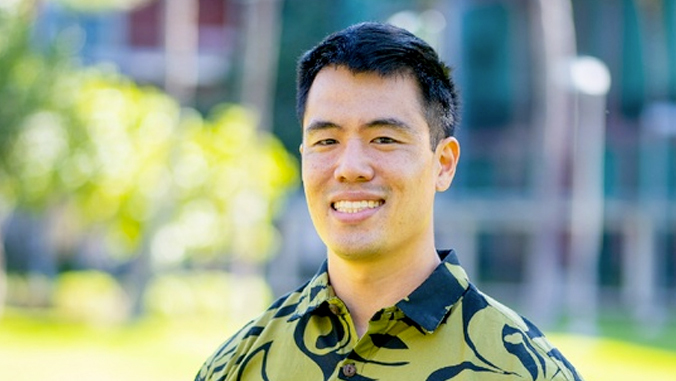
University of Hawaiʻi at Mānoa PhD candidate Lambert Leong has discovered a novel way to detect cancer and cancer risk using non-invasive medical techniques. The molecular bioscience and bioengineering major is leveraging medical imaging techniques with advanced machine learning and AI to investigate biomarkers of cancer, specifically for breast cancer, the leading cause of mortality against women.
This innovative research has earned Leong the 2022–23 Dr. Clifford K. Mirikitani, MD, JD & John M. Mirikitani, JD, PhD Outstanding Dissertation Award from the UH Mānoa Graduate Division.
Under the supervision of John Shepherd, a researcher at the UH Cancer Center, Leong has made exciting progress in pioneering advanced machine-learning methods for addressing the issues of data scarcity.
“The performance of AI models is driven by the amount of available labeled training data,” Shepherd said. “However, cleanly labeled data is often difficult to acquire especially in the medical and healthcare domains. Leong successfully overcame the scarcity of labeled data and built powerful AI models for body composition.”
“Our health models are being developed on unique (racially, ethnically and culturally) data from Hawaiʻi, and these models will be more powerful than those developed on homogeneous populations and therefore have the potential to address health disparities brought about by Hawaiʻi’s uniqueness,” Leong said.
As an undergraduate student in 2012, Leong used simple computer code, which someone else wrote, to analyze a modest amount of cancer data with little understanding of what was involved in conducting high quality research. Now, he is developing the code to analyze enormous amounts of cancer data with a more comprehensive understanding of how to properly conduct research.
“I am honored and humbled to receive this award, and credit must be given to my family, friends, labmates and advisor. Specifically, the University of Hawaiʻi Cancer Center, the molecular bioscience and bioengineering department, and Shepherd Research Lab played an integral part in my success,” said Leong. “I hope this will encourage other students to develop expertise in other areas of study and pursue similar trajectories. This award also represents my 10-year growth as a researcher.”
Shepherd stated that in his 23 years in academics, he ranks Leong in the top 1% of his students.
“He should be recognized for his work and its significance. The impact extends far beyond his dissertation obligations,” he said. “The work towards his specific research aims has been used to demonstrate the feasibility of funded and ongoing National Institutes of Health grants. Leong demonstrates the synergistic cross-departmental, institutional and community collaborations we want from all students. He is already working at the level of an early-stage faculty member and I am certain will go on to achieve great things in cancer research, ”

